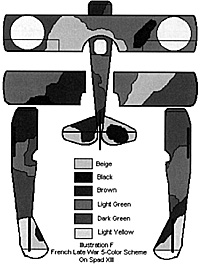 Colors
Colors
French aircraft camouflage went through three general phases.
From the war's start until mid-1916, aircraft generally appeared clear-doped. Wood surfaces were varnished to protect them, but otherwise left uncolored. Metal surfaces were either varnished or painted, generally (in the case of the Morane monoplanes) in black, though other colors did appear.
From mid-1916 until early 1918, the "Yellow Period", aircraft generally appeared in light yellow, with metal surfaces either varnished or painted yellow to match the other surfaces. Inter-plane struts were generally varnished wood, while fuselage and landing gear struts, and wheel centers, were yellow (or other colors - look at photos!). Most Nieuport 17s, and (allegedly) many Nieuport 10s, 11s, and 16s, left the factory aluminum-doped overall, with only their inter-plane struts remaining in varnished wood finish. This also applied to many Hanroit HD1s supplied to Belgium and Italy.
During the Yellow Period, basic camouflage began to appear, with bands of medium green and medium brown covering the upper surfaces, leaving the original light yellow or aluminum-doped lower surfaces exposed (See illustration G for a generic sample of banded camouflage.) There were many interesting variations on this theme. One had the dark upper surface colors overlap the flying surface leading and trailing edges (giving an outlined appearance to the undersides), leaving a silver outline to the control surfaces (on aluminum-doped aircraft). Another (it appears from photographs) sometimes had a dark (black?) border separating the green and brown areas on the upper surfaces.
From October 1917 until the war's end, the five-color scheme was introduced and prevailed as the primary French camouflage scheme. Each aircraft manufacturer used a slightly different template - standard to all of their aircraft - but the general scheme involved a combination of chestnut brown, dark green, light green, beige, and black on the upper surfaces, with light yellow, or less commonly, light gray under surfaces.
Books in the bibliography (in the datafiles…) provide templates for most of the manufacturers, so I won't reproduce them here, except for one sample - illustration F - which is the pattern used on SPAD XIIIs. Though the templates were supposed to be standard, manufacturers sometimes reversed the patterns or introduced unofficial colors, as available, into the patterns. Additionally, there were at least two variants of each color (a cellulose-based dope and one, an enamel varnish), just to make things more confusing. As before, fuselage and landing gear struts, and wheel covers, were generally painted, while inter-plane struts were generally varnished wood.
Markings
Early on, France standardized their aircraft markings. A tricolor roundel (illustration A) appeared in six positions - upper top wing, lower bottom wing, and fuselage sides - with a blue center and red outer ring, and the rudder was painted in tricolor vertical stripes, with red to the front, white in the center, and blue to the rear. Nieuport sesquiplanes often had roundels on the undersides of the upper wings, as well. Aircraft serial numbers appeared on the rudder stripes in black, with the government-assigned manufacturer code (e.g., N for Nieuport, S for SPAD, etc.) above it, also in black.
Unit markings appeared on fuselage and wings and were sometimes quite elaborate. France (unlike Great Britain) accepted the idea of the heroic ace, and heroes were permitted quite elaborate personal aircraft markings. Yet again, to truly appreciate this, examine photos!!!
More WWI Air Wargaming
-
WWI Air Wargaming Introduction
WWI Air Wargaming 1/300th Scale
WWI Air Wargaming 1/144th Scale
WWI Air Wargaming Painting, Markings, and Colors
WWI Air Wargaming France: colors and markings
WWI Air Wargaming Britain: colors and markings
WWI Air Wargaming Germany: colors and markings
WWI Air Wargaming Austro-Hungary: colors and markings
WWI Air Wargaming Italy: colors and markings
WWI Air Wargaming Russia: colors and markings
WWI Air Wargaming Belgium: colors and markings
WWI Air Wargaming Turkey: colors and markings
WWI Air Wargaming United States: colors and markings
WWI Air Wargaming Colors Chart (extremely slow: 600K)
Back to Table of Contents -- Courier #75
To Courier List of Issues
To MagWeb Master Magazine List
© Copyright 1998 by The Courier Publishing Company.
This article appears in MagWeb (Magazine Web) on the Internet World Wide Web.
Other military history articles and gaming articles are available at http://www.magweb.com